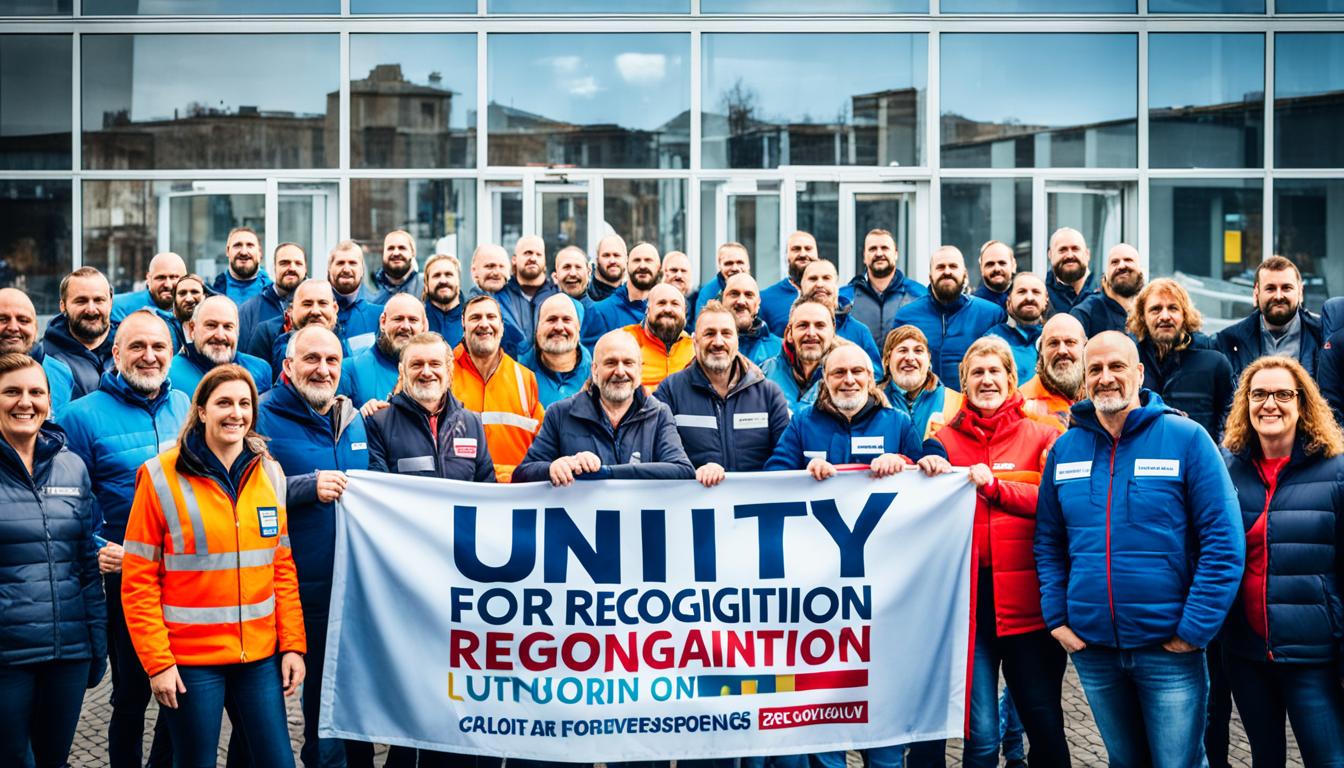
Welcome to our detailed guide for Indonesian citizens who want to work in Europe. This article covers the legal aspects, work visa rules, and work laws Indonesian expats should know when working in Europe. Knowing these rules is key to a successful and correct work experience, especially if you’re new to Europe.
Indonesia’s labor laws were shaped by Dutch legal influence. We’ll look at what these laws cover, like who is an employer or employee, types of work contracts, probation rules, and how wages are set. Knowing these basics will lay a good groundwork for understanding Europe’s employment laws.
We’ll also give you an insight into Indonesia’s economy and its ties with China. This helps in seeing why Indonesian citizens might choose to work in Europe. Plus, understanding Indonesia’s economic situation can be valuable information for your future in Europe.
Next, we’ll guide you through getting ready to work in Europe. This includes learning about the EU job market, how to look for jobs, and what language skills you might need. We’ll also cover the paperwork, like work permits and visas, and how to get your qualifications recognized.
We’ll look at employee representation and how relations work in Europe. This part will cover things like the role of trade unions, their rights, and how they act, as well as what works councils do. Knowing this info will help you understand and protect your rights at work.
To wrap up, it’s vital to know the laws and regulations of each European country. With a good understanding of Indonesian labor rights in Europe, you can confidently look for jobs and know your rights once you’re working. Good luck on your European work journey!
Key Takeaways:
- Indonesian citizens working in Europe must comply with the legal requirements and employment regulations of each country.
- Understanding Indonesian labor legislation is crucial for navigating European labor laws.
- Preparing to work in Europe involves familiarizing yourself with the EU job market, language proficiency requirements, and job search strategies.
- Legal and administrative procedures, such as work permits and visa requirements, should be researched and complied with.
- Employee representation through trade unions and works councils plays a significant role in industrial relations in Europe.
Country Profile of Indonesia
Indonesia is situated in Southeastern Asia and leads the ASEAN region in economic terms. It enjoys a stable political climate and is rich in natural resources. Its favorable location is a draw for foreign investments, facilitating economic growth. Indonesia is a significant trade partner of China. This partnership sees many Chinese companies investing in Indonesia’s economy.
Key sectors like manufacturing, mining, agriculture, and services are the driving forces of Indonesia’s economy. Thanks to foreign investments, the country has seen substantial economic progress. The Indonesian government actively welcomes foreign investors. It strives to make business operations smoother and more attractive through several policies.
The World Bank’s Doing Business report positions Indonesia at 73, reflecting its business-friendly environment efforts. The government has made moves to cut down on bureaucracy, simplify regulations, and make public services more efficient. These steps are designed to encourage more foreign investment and make Indonesia an even more appealing place to do business.
“Indonesia’s location, stable political situation, and abundant resources make it an attractive destination for foreign investments. Its trade partnership with China further enhances its economic prospects.”
Indonesia presents vast opportunities for trade and investment. Its strategic location and substantial market size are appealing to businesses aiming for regional expansion. The government’s focus on improving infrastructure is key to supporting economic growth and attracting increased foreign investment.
Foreign Investments in Indonesia
The Indonesian market attracts a significant number of foreign companies, especially from China. These firms are active in energy, infrastructure, manufacturing, technology, and consumer goods sectors. They see Indonesia as a valuable trade partner, given its economic potential.
On a major scale, the Belt and Road Initiative (BRI) involves China and aims to improve trade and connectivity. Indonesia’s involvement in this initiative is noteworthy. Chinese investments in Indonesia have notably supported the country’s infrastructure and sparked economic growth.
The consistent growth in foreign investments reflects international confidence in Indonesia’s economy and the welcoming environment the government has developed.
| Key Points | Indonesian Economy |
|---|---|
| Location | Southeastern Asia |
| Economic Standing | Largest economy in ASEAN |
| Foreign Investments | Significant inflow, particularly from China |
| Ease of Doing Business | Ranks 73rd out of 190 economies |
| Strategic Importance | Trade partner of China, favorable geographic location |
This image depicts Indonesia’s thriving economy, underlining its appeal to foreign investors.
Indonesia’s Labour Legal Framework
Indonesia’s labor laws are shaped by many key factors. These include the impact of Dutch law and the country’s varied ethnic groups. The legal system uses Dutch colonial laws, local customs, Islamic law, and laws made after the country gained independence. This mix makes the legal environment here special, considering Indonesia’s diverse society.
In Indonesia, the government divides its power clearly. The duties are shared among the People’s Consultative Assembly, the Supreme People’s Court, and the Government. This way, a fair authority balance is ensured, leading to more accountability.
The main labor law in Indonesia is the Manpower Law. This law tackles many work and job topics. It covers things like work contracts, relations at work, ending jobs, unions, and pay rules. The Manpower Law is key for protecting workers and managing the work situation fairly for both sides.
There are also rules like the Law on Job Creation and some government rules. These were made to guide specific job and labor matters. For example, one area these rules look at is hiring foreign workers in Indonesia. These additions help make Indonesia’s work laws better and up to date.
Indonesia’s labor law setup comes from its history and culture, mixing Dutch laws with local ways and today’s rules. This system makes sure that workers are safe and have a good work environment.
Role of Dutch Law in Indonesian Legal System
Dutch law’s influence on Indonesia’s legal system is very big. Indonesia was a Dutch colony for over 300 years. This time framed many aspects of Indonesian life, including its laws. Dutch legal ideas were taken and changed to fit local needs, creating a unique legal mix.
This can be seen in Indonesia’s use of the civil law system. This system is based on Dutch law. It focuses on written laws and legal codes. This gives a clear way to deal with legal matters, making decisions clearer and fairer.
Sources of Indonesian Law
Indonesian law comes from various places, showing Indonesia’s rich history and culture. It pulls from:
- Dutch Colonial Laws: These laws were very important during the time Indonesia was a Dutch colony.
- Customary Law: Local customs and traditions still affect how laws are made and applied today.
- Islamic Law: Indonesia being mostly Muslim means Islamic law plays a role, especially in family laws and personal matters.
- Laws Enacted After Independence: Since gaining independence, Indonesia has made many laws to keep up with new issues and global standards.
Using these different laws, Indonesia shows its dedication to a legal system that suits its special culture and history.
| Key Features of Indonesia’s Labor Legislation | Description |
|---|---|
| Labor Contracts | The Manpower Law makes sure that everyone knows their rights and duties in work contracts. |
| Industrial Relations | This law sets up how employers and workers should work together, aiming for harmony and fairness. |
| Termination of Labor Relations | It also says what is fair and right when a job is ended, protecting workers from bad treatment. |
| Trade Unions | Indonesia gives the right to unions to look after workers and talk about their needs together. |
| Wages | There are clear rules on lowest wages and how to figure out pay, making sure workers get fair pay. |
These labor laws in Indonesia aim to create a good and fair work setting. They look out for both employers and workers, making sure everyone’s rights are honored.
Characteristics of Indonesian Labour Legislation
Indonesian labour laws are different from Chinese ones, covering many topics. This knowledge is key for employers and workers in Indonesia’s job market.
Definition of Employer and Worker
The term ’employer’ in Indonesian law includes natural persons. This makes sure that labor laws protect workers in all job types. It also ensures employers meet their duties.
Employment Contracts
Contracts can be written or verbal in Indonesia. Yet, fixed-term contracts have to be written. This rule aims to avoid confusion and protect everyone involved.
Probationary Periods
In Indonesia, fixed-term contracts can’t have probation periods. But, in other contracts, employers can assess employees for up to three months before offering a permanent role.
Minimum Wage and Overtime Wages
The law outlines minimum and overtime wages. These are based on economic factors and job types. This ensures workers are fairly paid for extra work, unlike Chinese rules.
Understanding these laws is crucial for employers and workers. It helps promote fairness and compliance in the workplace.
Annual Leave and Religious Holiday Allowances
Employees enjoy annual leave and time off for religious holidays. These benefits support a balance between work and life. They also encourage diversity.
Employers and workers should know these rules well. This helps create a fair and positive work atmosphere.
Preparing to Work in Europe
Before starting your European job search, know the EU job market. Each European country has different needs for skills and jobs. So, it’s key to research the job market and figure out which jobs are in high demand. This helps you match your skills with what employers need, making it easier to land a job.

Being good at European languages is a big plus for working in Europe. Languages like English, French, German, or Spanish can boost your job search. It’s smart to work on your language skills before you look for a job.
Making your resume fit European standards is important too. Working with a career professional can help. They can give advice on how to make your resume stand out to European employers. This means showing off skills and experiences the right way.
Having a clear job search plan is a must for success. Start by focusing your search on a specific country and industry. Look for places where your skills are needed. Use online job sites and recruitment agencies that help international candidates find jobs in Europe.
Networking is crucial too. Join professional platforms like LinkedIn. Connect with people in your industry. They can offer helpful tips and maybe even job leads.
To sum up, understanding the EU job market and its needs, improving your language skills, and using smart job search strategies can boost your job chances in Europe.
Legal and Administrative Procedures for Working in Europe
For Indonesian citizens looking to work in Europe, knowing the rules is vital. This means understanding the work permits and visas needed for each country. Rules for these can be different for each place, so it’s important to do your research.
Getting your qualifications recognized is also crucial. Depending on what you do, you might need your skills and education checked in the EU. Reach out to the right people in your new country to help guide you through this.
Moving to Europe for a job can be hard but there’s help available. You can get support to find a place to live, deal with government processes, and learn about the culture. Using these services can make your move smoother and help you adjust better.
Let’s take a detailed look at important steps to work in Europe:
Work Permits and Visas
Getting the right work permits and visas is key for Indonesians wanting to work in Europe. Every EU country has its own rules for these. Some might need special permits for certain jobs, while others have general ones.
It’s a must to check the official websites or call the local immigration office for the latest on how to apply. They can guide you in the application process, what documents they need, and how long it might take.
Recognition of Qualifications
Professionals from Indonesia working in Europe might have to prove their qualifications are up to the EU’s standards. This process shows your education and skills match what the local job needs.
To get your qualifications recognized, you usually have to send in your education papers, job history, and more. The right EU bodies will look at these and tell you if your qualifications are good as they are or if you need to do more.
Relocation and Integration Support
Moving to Europe can be hard, but there are services to help you settle in. These services can help you find a home, sort out government paperwork, and get to know the culture.
Working with experts in moving can make your life easier. They know the local area and can help you manage the challenges of moving and starting a new life.
“Relocation and integration support services can greatly benefit Indonesian citizens working in Europe. From assisting with logistics to providing cultural guidance, these services ensure a smoother and more successful transition.”
By learning the rules and taking the right steps, Indonesians can meet the requirements to work in Europe. Doing your homework, getting professional help, and having all your documents ready will lead to a successful and less stressful work time in Europe.
| Country | Work Permit Process | Visa Requirements |
|---|---|---|
| Germany | Employer sponsorship with job offer, proof of qualification, and sufficient salary | Valid passport, proof of accommodation, health insurance, financial resources |
| France | Employer sponsorship, proof of qualification and employment contract | Valid passport, proof of accommodation, health insurance, financial resources |
| Netherlands | Employer sponsorship, proof of qualification, and labor market test | Valid passport, proof of accommodation, health insurance, financial resources |
| United Kingdom | Points-based system based on job offer, qualifications, and English language proficiency | Valid passport, biometric residence permit |
Employee Representation and Industrial Relations in Europe
In Europe, trade unions are key in standing up for workers and keeping relations smooth. They allow workers to unite, giving them power to discuss their job terms together. This group effort shows Europe’s strong support for the rights of workers.
Europe is also big on works councils. These groups talk to both bosses and workers, bringing up issues in each workplace. By doing this, they make sure what workers need is really thought about.
Joining corporate boards isn’t a given for workers in Europe. A few places, like Germany, follow laws making sure workers have a voice there. But, this rule isn’t found everywhere.
The Rights of Trade Unions
Trade unions have a lot of freedom and protection in Europe. They can grow their numbers and work for better working conditions without fear. These rights are set in stone by national and EU laws, stopping anyone from getting in the way.
These unions also get to make deals with employers. These deals, or agreements, set rules about pay and work conditions in different jobs. They help keep the workplace fair for everyone.
Industrial Action Regulations in Europe
Going on strike can help unions get what they want and protect their members. But, there are rules about how they can do this. This is important to avoid big problems for everyone else.
Each European country has its own rules for strikes. They might need to tell their plans early or get help from a middleman. Some jobs, like those taking care of the public, might not be allowed to strike. The point is to look out for everyone’s best interests.
Works Councils in Europe
Works councils are a big part of the job scene in Europe. They’re made up of workers chosen to speak for the group in talks with bosses. Together, they handle things like making sure workplaces are safe and looking out for worker happiness.
These councils connect management with workers. They help keep everyone talking and working together. Their way of making decisions together builds stronger teams and happy work settings.

Across Europe, jobs are marked by trade unions, talks, strike guidelines, and works councils. These all show how Europe is keen on fairness and partnership in workspaces. They balance the needs of both sides, making work a better place for all.
Conclusion
Getting a job in Europe as someone from Indonesia means understanding a lot of rules and laws. You must know about work permits, visas, and local labor laws. Each country has its own set of these, which might be different from what you’re used to in Indonesia.
To work smoothly in Europe, you need to learn about their work laws and how they differ from Indonesia. Knowing these things will help you protect your rights at work. This also involves getting the right work papers, visas, and understanding how work is done there.
Understanding pay rules, when you can work overtime, and who speaks for workers is crucial. Being informed makes moving to Europe for work easier and more enjoyable. With the right info and planning, anyone from Indonesia can follow their dreams in Europe. And, they’ll know their work rights are respected too.
